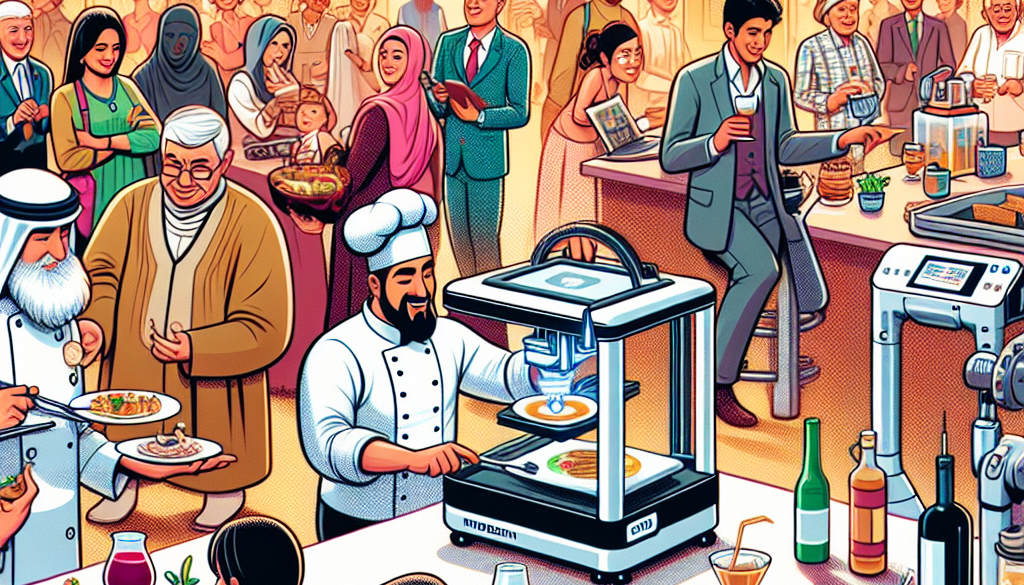Revolutionary Trends in the Food and Beverage Sector
-
Table of Contents
- Revolutionary Trends Shaping the Food and Beverage Sector
- 1. Sustainability and Ethical Practices
- 2. Health and Wellness Focus
- 3. Technological Innovations in Food Production
- 4. The Rise of Alternative Proteins
- 5. Personalization and Customization
- 6. E-commerce and Direct-to-Consumer Models
- Conclusion
- ETprotein: Leading the Way in Alternative Protein Solutions
Revolutionary Trends Shaping the Food and Beverage Sector

The food and beverage industry is a dynamic and ever-evolving sector, influenced by a myriad of factors including technological advancements, consumer preferences, and global economic conditions. As we delve into the latest trends, it’s clear that innovation is at the forefront, driving significant changes in how products are developed, marketed, and consumed. This article explores the revolutionary trends that are currently shaping the food and beverage landscape.
1. Sustainability and Ethical Practices
Consumers are increasingly aware of the environmental impact of their food choices, leading to a surge in demand for sustainable and ethically sourced products. This trend is not just about organic farming; it encompasses a broader range of practices, such as:
- Reducing carbon footprint through local sourcing and efficient logistics
- Minimizing food waste by embracing nose-to-tail and root-to-stem cooking
- Implementing regenerative agriculture to restore soil health
- Adopting plant-based and lab-grown alternatives to reduce reliance on animal agriculture
Statistics show that 73% of global consumers would change their consumption habits to reduce their environmental impact, according to Nielsen.
2. Health and Wellness Focus
The health and wellness trend continues to gain momentum, with consumers seeking out foods and beverages that offer functional benefits. This has led to the rise of:
- Superfoods and ingredients with high nutritional value
- Products fortified with vitamins, minerals, and other supplements
- Functional beverages such as probiotic drinks, wellness shots, and herbal teas
- Low-sugar, low-carb, and keto-friendly options catering to specific dietary needs
Market research by Mordor Intelligence predicts that the global functional food market will reach USD 275.77 billion by 2025, growing at a CAGR of 7.7% during the forecast period (2020-2025).
3. Technological Innovations in Food Production
Technology is revolutionizing the food and beverage industry, from production to distribution. Key technological trends include:
- Automation and robotics in food processing and packaging
- Artificial intelligence for demand forecasting and personalized nutrition
- Blockchain for traceability and transparency in the supply chain
- 3D food printing for customized food shapes and nutrition
According to a report by ING, technology helps food manufacturers produce more efficiently for a growing world population. There is an annual 3% increase in efficiency within the industry due to technological advancements.
4. The Rise of Alternative Proteins
Alternative proteins are no longer a niche market; they have become mainstream as consumers look for healthier and more sustainable meat substitutes. This includes:
- Plant-based proteins derived from soy, peas, and other legumes
- Insect protein as a sustainable and nutrient-rich option
- Cultured meat grown in labs from animal cells
- Algae and fungi-based proteins offering unique health benefits
The alternative protein market is expected to reach $17.9 billion by 2025, according to a report by MarketsandMarkets.
5. Personalization and Customization
With the advent of big data and advanced analytics, food and beverage companies can now offer personalized experiences to their customers. This trend includes:
- Customized meal kits and subscription boxes based on dietary preferences
- Personalized nutrition plans using DNA testing and AI algorithms
- Smart packaging that interacts with consumers and provides tailored information
- Bespoke flavor profiles and limited-edition products
A study by Deloitte found that 1 in 5 consumers who expressed interest in personalized products are willing to pay a 20% premium.
6. E-commerce and Direct-to-Consumer Models
The rise of online shopping has transformed the food and beverage sector, with brands increasingly adopting direct-to-consumer (D2C) models. This shift allows for:
- Greater control over brand messaging and customer relationships
- Agile response to market trends and consumer feedback
- Subscription services for recurring revenue streams
- Access to a wealth of consumer data for targeted marketing
eMarketer estimates that food and beverage e-commerce sales will surpass $38 billion in the US by 2023, making it the fastest-growing product category online.
Conclusion
The food and beverage industry is undergoing a transformation driven by sustainability, health consciousness, technological innovation, the rise of alternative proteins, personalization, and the growth of e-commerce. Companies that adapt to these trends will thrive in the changing landscape, meeting the demands of a more informed and discerning consumer base.
ETprotein: Leading the Way in Alternative Protein Solutions
In line with the trend towards alternative proteins, ETprotein offers a range of high-quality, organic bulk vegan proteins that cater to the evolving needs of the food and beverage industry. Their products, including rice protein, pea protein, and various seed proteins, are characterized by a neutral taste, non-GMO, allergen-free attributes, and high purity levels. ETprotein’s commitment to excellence makes them a top choice for businesses looking to innovate in the sector.
About ETprotein:
ETprotein, a reputable protein and L-(+)-Ergothioneine (EGT) Chinese factory manufacturer and supplier, is renowned for producing, stocking, exporting, and delivering the highest quality organic bulk vegan proteins and L-(+)-Ergothioneine. They include Organic rice protein, clear rice protein, pea protein, clear pea protein, watermelon seed protein, pumpkin seed protein, sunflower seed protein, mung bean protein, peanut protein, and L-(+)-Ergothioneine EGT Pharmaceutical grade, L-(+)-Ergothioneine EGT food grade, L-(+)-Ergothioneine EGT cosmetic grade, L-(+)-Ergothioneine EGT reference grade and L-(+)-Ergothioneine EGT standard. Their offerings, characterized by a neutral taste, non-GMO, allergen-free attributes, with L-(+)-Ergothioneine purity over 98%, 99%, cater to a diverse range of industries. They serve nutraceutical, pharmaceutical, cosmeceutical, veterinary, as well as food and beverage finished product distributors, traders, and manufacturers across Europe, USA, Canada, Australia, Thailand, Japan, Korea, Brazil, and Chile, among others.
ETprotein specialization includes exporting and delivering tailor-made protein powder and finished nutritional supplements. Their extensive product range covers sectors like Food and Beverage, Sports Nutrition, Weight Management, Dietary Supplements, Health and Wellness Products, and Infant Formula, ensuring comprehensive solutions to meet all your protein needs.
As a trusted company by leading global food and beverage brands and Fortune 500 companies, ETprotein reinforces China’s reputation in the global arena. For more information or to sample their products, please contact them and email sales(at)ETprotein.com today.












